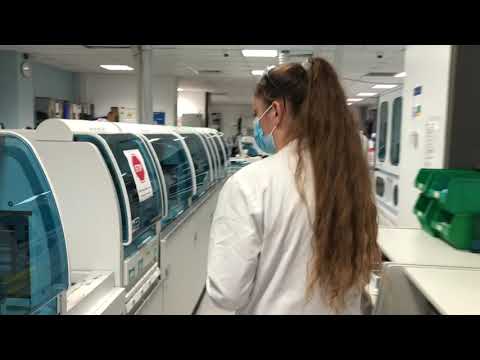Biomedical Scientist: Job Description and Salary Revealed!

Biomedical Scientist Job Description Template
Biomedical Scientist is a healthcare professional who plays a crucial role in the diagnosis, treatment, and prevention of diseases. They work in laboratories and are responsible for conducting various medical tests and experiments to analyze samples and generate accurate results. One of the key responsibilities of a Biomedical Scientist is to perform complex laboratory tests on patient samples, such as blood, urine, or tissue samples. They use a wide range of techniques and equipment to examine these samples and identify the presence of diseases or abnormalities. They also analyze the results and provide detailed reports to the healthcare team, including doctors and specialists, for further diagnosis and treatment planning. Another important aspect of their job is to develop and validate new laboratory tests and procedures. They constantly stay updated with the latest advancements in medical technology and research to enhance the accuracy and efficiency of diagnostic tests. They may also collaborate with other healthcare professionals and researchers to contribute to the development of new treatments and therapies. In addition, Biomedical Scientists are responsible for maintaining and calibrating laboratory equipment, ensuring the accuracy and reliability of test results. They follow strict protocols and safety measures to prevent contamination and maintain a clean and organized laboratory environment. Overall, the role of a Biomedical Scientist is crucial in the field of healthcare as they provide vital information to aid in the diagnosis and treatment of diseases. Their expertise and attention to detail are essential in ensuring accurate and reliable test results, ultimately contributing to the improvement of patient care and outcomes.Biomedical Scientist Responsibilities
Biomedical Scientist Requirements
How Much Does A Biomedical Scientist Make?
Biomedical Scientist Salary
| Job Level | Annual Salary |
|---|---|
| Entry-Level | $50,000 – $70,000 |
| Experienced | $70,000 – $90,000 |
| Senior-Level | $90,000 – $120,000 |
A biomedical scientist plays a crucial role in the healthcare industry by conducting research and experiments to develop and improve medical treatments and technologies. The salary of a biomedical scientist varies depending on factors such as experience, job level, and location. Entry-level biomedical scientists can expect to earn an annual salary ranging from $50,000 to $70,000. As they gain more experience, their salary can increase to around $70,000 to $90,000 for experienced professionals. Senior-level biomedical scientists with extensive expertise and leadership responsibilities can earn between $90,000 and $120,000 per year. These salary ranges are approximate and may vary based on individual qualifications and the specific organization they work for.
Biomedical Scientist Salaries by Country
Top Paying Countries for Biomedical Scientist
| Country | Average Salary (USD) |
|---|---|
| United States | $85,216 |
| Switzerland | $78,994 |
| Australia | $68,271 |
| Germany | $65,646 |
| United Kingdom | $54,610 |
Biomedical scientists play a crucial role in the field of healthcare, conducting research and experiments to improve medical treatments and technologies. The salaries of these professionals vary significantly depending on the country they work in. According to the data, the top paying countries for biomedical scientists are the United States, Switzerland, Australia, Germany, and the United Kingdom. In the United States, biomedical scientists earn an average salary of $85,216 per year, making it the highest paying country for this profession. Switzerland follows closely behind with an average salary of $78,994, while Australia, Germany, and the United Kingdom offer slightly lower but still competitive salaries in the range of $54,610 to $68,271.
A video on the topic Biomedical Scientist
Video Source : Siobhan TaylorHCSInterview Questions for Biomedical Scientist
1. What is the role of a Biomedical Scientist?
A Biomedical Scientist is responsible for conducting scientific research and investigations in order to diagnose and understand diseases. They analyze patient samples, perform experiments, and interpret the results to provide accurate and reliable information for patient care.
2. What skills are important for a Biomedical Scientist?
Important skills for a Biomedical Scientist include strong analytical and problem-solving abilities, attention to detail, excellent communication skills, proficiency in laboratory techniques and equipment, and a solid understanding of biological and medical principles.
3. What are some common laboratory techniques used by Biomedical Scientists?
Common laboratory techniques used by Biomedical Scientists include polymerase chain reaction (PCR), enzyme-linked immunosorbent assay (ELISA), chromatography, microscopy, electrophoresis, and cell culture techniques.
4. Can you explain the process of conducting a research study as a Biomedical Scientist?
As a Biomedical Scientist, conducting a research study involves identifying a research question, designing the study protocol, collecting and analyzing data, interpreting the results, and disseminating the findings through scientific publications or presentations.
5. How do Biomedical Scientists contribute to patient care?
Biomedical Scientists contribute to patient care by providing accurate and timely laboratory results that aid in the diagnosis, treatment, and monitoring of diseases. They work closely with healthcare professionals to ensure the best possible outcomes for patients.
6. What are some challenges faced by Biomedical Scientists?
Some challenges faced by Biomedical Scientists include managing and prioritizing multiple projects, dealing with complex and diverse data sets, staying updated with advancements in technology and research, and working under pressure to meet deadlines.
7. How does research conducted by Biomedical Scientists contribute to medical advancements?
Research conducted by Biomedical Scientists contributes to medical advancements by expanding our understanding of diseases, identifying new diagnostic methods and treatment options, and improving existing healthcare practices. It plays a crucial role in advancing medical knowledge and improving patient outcomes.
8. Can you explain the importance of quality control and assurance in a biomedical laboratory?
Quality control and assurance are essential in a biomedical laboratory to ensure accurate and reliable test results. It involves implementing standardized protocols, regular calibration of equipment, validating testing methods, and conducting proficiency testing to maintain high standards of accuracy and precision.
9. How do Biomedical Scientists stay updated with the latest research and advancements in their field?
Biomedical Scientists stay updated with the latest research and advancements in their field by attending scientific conferences, reading scientific journals, participating in continuing education programs, and collaborating with other researchers and professionals in their field.
10. Can you describe the ethical considerations in biomedical research?
Ethical considerations in biomedical research include obtaining informed consent from study participants, ensuring patient confidentiality, conducting research on animal models with proper welfare considerations, and adhering to ethical guidelines and regulations set by governing bodies. The well-being and rights of research subjects are of utmost importance in biomedical research.






